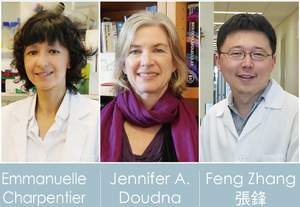TAIPEI, TAIWAN--(Marketwired - Jun 19, 2016) - Drs. Emmanuelle Charpentier, Jennifer A. Doudna, and Feng Zhang were announced today as the winners of the 2016 Tang Prize in Biopharmaceutical Science "for the development of CRISPR/Cas9 as a breakthrough genome editing platform that promises to revolutionize biomedical research and disease treatment." The three joint winners will share the cash prize of approximately US$1.24 million, as well as a grant of approx. US$311,000.
Scientists noticed as early as the 1980s that in certain bacteria, there occurred clusters of repeated sequences, which became known as CRISPR (Clustered Regularly Interspaced Short Palindromic Repeats). It was later discovered that these repeats were part of a bacterial defense system. Small pieces of viral DNA (spacers between the repeats) were "memorized" in the bacterial genome to aid in recognition and defense against dangerous bacteriophages. RNAs transcribed from CRISPR would help identify the threatening virus, and nucleases encoded by CRISPR-associated (Cas) genes would then be responsible for "cutting" the virus, rendering it harmless.
Building on these discoveries, Charpentier first identified that there are two RNA species which guide Cas9 to the target gene. Working together, Charpentier and Doudna demonstrated that these two RNAs can be linked together to become a programmable single guide RNA, which could then target any desired gene. The development of their two-component system made efficient genome editing possible. Meanwhile, working independently, Zhang first reported the successful adaption of Cas9-based genome editing in mammalian and human cells. He further improved approaches for simultaneously targeting multiple genes and homology-based gene repair.
The work of these three scientists have revolutionized the genome editing platform, making it programmable, accessible and scalable like never before. Already, the Cas9 system has opened the doors to new therapies that benefit human beings. The technology may be further adapted to engineer human stem cells for disease modeling, drug screening and identification of essential genes, tumor suppressors, regulators of cell differentiation, or genes sensitive to viral or pathogen infection. Harnessing this revolutionary technology to improve various aspects of human health is already underway, and is limited only by imagination and ingenuity.
It has long been the scientist's dream to have the ability to precisely and effectively modify individual genes or "edit" out defective ones. Because of the breakthrough discoveries of the three recipients of this year's Tang Prize in Biopharmaceutical Science, that "someday" is "today".
Founded in 2012 by Samuel Yin, the Tang Prize awards achievements in four categories: Sustainable Development, Biopharmaceutical Science, Sinology, and Rule of Law. The newest round of awardees will be announced live streaming on June 18-21, 2016, and will receive the medal, diploma, and cash prize at the award ceremony on September 25 in Taipei.
About Tang Prize
Dr. Samuel Yin, chairman of Ruentex Group, founded the Tang Prize in December of 2012 as an extension of the supreme value his family placed on education. Harkening back to the golden age of the Tang Dynasty in Chinese history, the Tang Prize seeks to be an inspiring force for people working in all corners of the world. For more information on the Tang Prize and its laureates, please visit www.tang-prize.org
Contact Information:
Contact Person/Email
Jocelyn Chen / Blake Brownrigg
E-mail:
